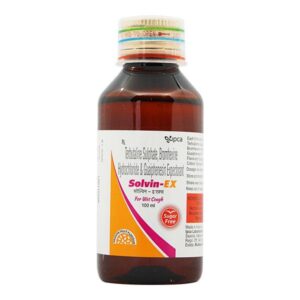BROMHEXINE + GUAIPHENESIN + TERBULATINE
Bromhexine: Bromhexine is a medication primarily used to treat respiratory conditions such as coughs and chest congestion. It is classified as a mucolytic drug, which means it helps to thin and loosen mucus in the respiratory tract, making it easier to cough up.
The mechanism of action of Bromhexine involves increasing the production and secretion of mucus in the respiratory tract. It activates the enzyme responsible for breaking down complex mucus molecules into smaller, less viscous ones. This action helps to clear the airways and alleviate cough and congestion associated with respiratory illnesses.
The recommended dose of Bromhexine may vary depending on the specific formulation and strength of the product. Generally, it is taken orally in the form of tablets or syrup. It is important to follow the instructions provided by the healthcare professional or to read the package insert for the correct dosage and administration guidelines.
While Bromhexine is generally well-tolerated, it can cause some side effects in some individuals. Common side effects may include gastrointestinal disturbances such as nausea, vomiting, diarrhea, and stomach upset. Rarely, allergic reactions such as skin rashes, itching, or swelling may occur. If any severe or unusual side effects are experienced, it is important to seek medical attention immediately.
As with any medication, Bromhexine should only be taken under the guidance of a healthcare professional. It is not recommended in certain conditions such as gastrointestinal ulcers or hypersensitivity to the drug. It is also important to disclose any other medications being taken to avoid potential drug interactions.
Guaiphenesin: Guaifenesin is a medication commonly used as an expectorant to help loosen and thin mucus in the airways, making it easier to cough up. It is approved for the treatment of coughs associated with respiratory tract infections and conditions such as bronchitis, sinusitis, and the common cold.
The mechanism of action of guaifenesin is not fully understood. It is believed to work by increasing the volume and reducing the viscosity of respiratory tract secretions, which helps to promote the clearance of mucus and phlegm.
The usual recommended dose of guaifenesin for adults and children 12 years of age and older is 600 to 1200 mg, taken orally every 12 hours. Children between 6 and 12 years of age usually take 300 to 600 mg every 12 hours, while children between 2 and 6 years of age take 200 to 300 mg every 12 hours.
Some common side effects of guaifenesin may include dizziness, headache, drowsiness, nausea, vomiting, stomach upset, and rash. These side effects are usually mild and temporary. Allergic reactions to guaifenesin are rare but can occur. Signs of an allergic reaction may include hives, itching, swelling, difficulty breathing, or rash.
As with any medication, it is important to consult with a healthcare professional before using guaifenesin to ensure proper dosage and to discuss any potential risks or interactions with other medications.
Terbulatine: Terbutaline is a bronchodilator drug commonly used to treat asthma and other respiratory conditions such as chronic obstructive pulmonary disease (COPD). It belongs to a class of medications called beta-2 adrenergic agonists.
Terbutaline works by relaxing the muscles of the airways, allowing them to widen and make breathing easier. It stimulates beta-2 adrenergic receptors in the smooth muscles of the bronchial tubes, which causes the muscles to relax and relieves bronchospasms.
The normal adult dose of terbutaline for asthma is 2.5 to 5 mg taken orally every 6 to 8 hours as needed. However, the dosage may vary depending on the individual and the severity of the condition. It is important to follow the instructions provided by a healthcare professional or the medication label.
Common side effects of terbutaline may include tremors, headache, increased heart rate, palpitations, nervousness, dizziness, and muscle cramps. These side effects are usually mild and temporary. However, if they become severe or persistent, it is important to consult a healthcare professional.
Terbutaline should not be used in certain conditions such as heart rhythm disorders, uncontrolled high blood pressure, or during pregnancy (unless specifically prescribed). It should also be used with caution in individuals with diabetes or hyperthyroidism.
As with any medication, it is important to discuss the potential risks and benefits of terbutaline with a healthcare professional before starting the treatment.

